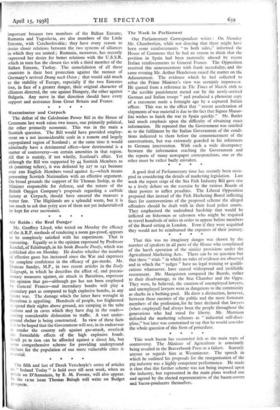Westminster and Corpach The defeat of the Caledonian Power Bill
in the House of Commons last week raises two issues, one primarily political, the other primarily economic. This was in the main a Scottish question. The Bill , would have provided employ-. ment on a not inconsiderable scale in a remote and largely unpopulated region of Scotland ; at the same time it would admittedly have a detrimental effect—how detrimental is a 'matter of controversy—on certain amenities in that region. All that is mainly, if not wholly, Scotland's affair. Yet although the Bill was supported by 44 Scottish Members to 16 (omitting tellers), it was defeated by 227 to 141 because over 200 English Members voted against it,—which means presenting Scottish Nationalists with an effective argument. On broad grounds the support of Sir Thomas Inskip, as the Minister responsible for defence, and the nature of the British Oxygen Company's proposals regarding a carbide factory at Corpach, should have ensured the measure a better fate. The Highlands are a splendid waste, but it is too much to ask that every acre of them not yet industrialised - be kept for ever sacrosanct- * * * *






































 Previous page
Previous page